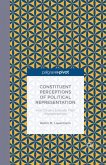This book reconnects The Federalist Papers to the study of American politics and political development, arguing that the papers contain previously unrecognized theory of institutional power, a theory that enlarges and refines the contribution of the papers to political theory, but also reconnects the papers to the study of American politics.
"Wirls' fresh and compelling treatment of institutional power and dynamics in The Federalist Papers reveals what has been neglected in thinking about this canonical work. It also illuminates what we stand to gain in adopting The Federalist Papers' view of institutional power: offering us a way to understand more fully what political development looks like and why it takes the form that it does. Wirls' book will be of interest to scholars of both American Political Thought and American Political Development, setting an ambitious agenda for future scholarship that combines areas of study that too often sit apart." - George Thomas, Claremont McKenna College, USA
"In this exceptionally thoughtful and elegant interpretation of The Federalist Papers, Wirls does two difficult but very important things at once: he provides a brief but comprehensive account of the intellectual unity of Federalist and simultaneously shows that Publius's nuanced institutionalism can decisively contribute to and advance the institutionalist preoccupations of American political development scholars. This is a must - and very rewarding - read for scholars of American political thought and American political development." - Rick Valelly, Swarthmore College, USA
"In this exceptionally thoughtful and elegant interpretation of The Federalist Papers, Wirls does two difficult but very important things at once: he provides a brief but comprehensive account of the intellectual unity of Federalist and simultaneously shows that Publius's nuanced institutionalism can decisively contribute to and advance the institutionalist preoccupations of American political development scholars. This is a must - and very rewarding - read for scholars of American political thought and American political development." - Rick Valelly, Swarthmore College, USA








